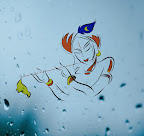New Composition in Raag Basant: Mai Mai Dhan Payo Har Naam -
In this shabad, Guru Tegh Bahadur expresses the ultimate fulfillment found in the wealth of the Hari's Name. The restless mind, once chasing worldly desires, now sits in stillness, having found true rest (bisram). In the composition I tried to reflect the running and resting in the music.
Guru Sahib explains that attachment to Maya—illusion and possessiveness—has vanished, replaced by the clarity of divine wisdom. This transformation leads to an inner state where greed and attachment cannot even approach. Instead, the soul clings to the path of devotion, discovering a priceless jewel—the Naam.
The Guru presents this journey as the dissolution of doubt and desire, allowing one to merge into nij sukh—the pure bliss of one's own inner being. But such a state is not achieved through effort alone; it is the result of divine grace. The closing lines emphasize that only the Gurmukh—one who turns towards the Guru—gathers this wealth of realization.
Why is this Shabad in Raag Basant?
The choice of Basant amplifies the theme of transformation. Raag Basant is traditionally associated with the rejuvenation of spring, the melting away of winter’s cold, and the blossoming of new life. In the context of this shabad, Basant symbolizes an inner spring—the renewal of the soul upon realizing the Naam. Just as nature sheds the barrenness of winter, the seeker in this shabad sheds attachments, cynicism, and desire, stepping into a state of spiritual awakening. The joy of divine wisdom is not just intellectual but experiential, much like the vibrant bloom of springtime.
ਬਸੰਤੁ ਮਹਲਾ ੯ ॥
basa(n)t mahalaa nauvaa ||
बसंतु महला ९ ॥
Basant, Ninth Mehla:
ਮਾਈ ਮੈ ਧਨੁ ਪਾਇਓ ਹਰਿ ਨਾਮੁ ॥
maiee mai dhan paio har naam ||
माई मै धनु पाइओ हरि नामु ॥
O mother, I have gathered the wealth of the Lord's Name.
ਹੇ (ਮੇਰੀ) ਮਾਂ! (ਜਦੋਂ ਦਾ ਗੁਰੂ ਦੀ ਸਰਨ ਪੈ ਕੇ) ਮੈਂ ਪਰਮਾਤਮਾ ਦਾ ਨਾਮ-ਧਨ ਹਾਸਲ ਕੀਤਾ ਹੈ,
ਹੇ (ਮਾਈ) ਸੰਤ ਜਨੋਂ! ਮੈਂਨੇ ਹਰੀ ਨਾਮੁ ਧਨੁ ਪਾਇਆ ਹੈ॥
ਮਨੁ ਮੇਰੋ ਧਾਵਨ ਤੇ ਛੂਟਿਓ ਕਰਿ ਬੈਠੋ ਬਿਸਰਾਮੁ ॥੧॥ ਰਹਾਉ ॥
man mero dhaavan te chhooTio kar baiTho bisaraam ||1|| rahaau ||
मनु मेरो धावन ते छूटिओ करि बैठो बिसरामु ॥१॥ रहाउ ॥
My mind has stopped its wanderings, and now, it has come to rest. ||1||Pause||
ਮੇਰਾ ਮਨ (ਮਾਇਆ ਦੀ ਖ਼ਾਤਰ) ਦੌੜ-ਭੱਜ ਕਰਨ ਤੋਂ ਬਚ ਗਿਆ ਹੈ, (ਹੁਣ ਮੇਰਾ ਮਨ ਨਾਮ-ਧਨ ਵਿਚ) ਟਿਕਾਣਾ ਬਣਾ ਕੇ ਬਹਿ ਗਿਆ ਹੈ ।੧।ਰਹਾਉ।
ਅਬ ਮੇਰਾ ਮਨੁ ਧਾਵਨੇ ਸੇ (ਛੂਟਿਓ) ਰਹਿਤੁ ਹੂਆ ਹੈ ਔਰ ਸ੍ਵਰੂਪ ਮੇਂ (ਬਿਸਰਾਮੁ) ਇਸਥਤੀ ਕਰ ਬੈਠਾ ਹੈ॥੧॥ ਰਹਾਉ ॥
ਮਾਇਆ ਮਮਤਾ ਤਨ ਤੇ ਭਾਗੀ ਉਪਜਿਓ ਨਿਰਮਲ ਗਿਆਨੁ ॥
maiaa mamataa tan te bhaagee upajio niramal giaan ||
माइआ ममता तन ते भागी उपजिओ निरमल गिआनु ॥
Attachment to Maya has run away from my body, and immaculate spiritual wisdom has welled up within me.
ਹੇ ਮੇਰੀ ਮਾਂ! (ਗੁਰੂ ਦੀ ਕਿਰਪਾ ਨਾਲ ਮੇਰੇ ਅੰਦਰ) ਸੁੱਧ-ਸਰੂਪ ਪਰਮਾਤਮਾ ਨਾਲ ਡੂੰਘੀ ਸਾਂਝ ਬਣ ਗਈ ਹੈ (ਜਿਸ ਕਰਕੇ) ਮੇਰੇ ਸਰੀਰ ਵਿਚੋਂ ਮਾਇਆ ਜੋੜਨ ਦੀ ਲਾਲਸਾ ਦੂਰ ਹੋ ਗਈ ਹੈ ।
ਮਾਯਾ ਕੀ ਮਮਤਾ (ਤਨ ਤੇ) ਮਨ ਸੇ ਭਾਗੀ ਹੈ ਔਰ ਨਿਰਮਲ ਗ੍ਯਾਨੁ ਉਤਪੰਨ ਹੂਆ ਹੈ॥
ਲੋਭ ਮੋਹ ਏਹ ਪਰਸਿ ਨ ਸਾਕੈ ਗਹੀ ਭਗਤਿ ਭਗਵਾਨ ॥੧॥
lobh moh eh paras na saakai gahee bhagat bhagavaan ||1||
लोभ मोह एह परसि न साकै गही भगति भगवान ॥१॥
Greed and attachment cannot even touch me; I have grasped hold of devotional worship of the Lord. ||1||
(ਜਦੋਂ ਤੋਂ ਮੈਂ) ਭਗਵਾਨ ਦੀ ਭਗਤੀ ਹਿਰਦੇ ਵਿਚ ਵਸਾਈ ਹੈ ਲੋਭ ਅਤੇ ਮੋਹ ਇਹ ਮੇਰੇ ਉਤੇ ਆਪਣਾ ਜ਼ੋਰ ਨਹੀਂ ਪਾ ਸਕਦੇ ।੧।
ਲੋਭ ਅਰ ਮੋਹ ਯਿਹ ਸੁਪਰਸ ਨਹੀਂ ਕਰ ਸਕਤੇ ਹੈਂ, ਕ੍ਯੋਂਕਿ ਭਗਵਾਨ ਕੀ ਭਗਤੀ ਗ੍ਰਹਣ ਕਰੀ ਹੈ॥੨॥
ਜਨਮ ਜਨਮ ਕਾ ਸੰਸਾ ਚੂਕਾ ਰਤਨੁ ਨਾਮੁ ਜਬ ਪਾਇਆ ॥
janam janam kaa sa(n)saa chookaa ratan naam jab paiaa ||
जनम जनम का संसा चूका रतनु नामु जब पाइआ ॥
The cynicism of countless lifetimes has been eradicated, since I obtained the jewel of the Naam, the Name of the Lord.
ਹੇ ਮੇਰੀ ਮਾਂ! ਜਦੋਂ ਤੋਂ (ਗੁਰੂ ਦੀ ਕਿਰਪਾ ਨਾਲ) ਮੈਂ ਪਰਮਾਤਮਾ ਦਾ ਅਮੋਲਕ ਨਾਮ ਲੱਭਾ ਹੈ, ਮੇਰਾ ਜਨਮਾਂ ਜਨਮਾਂਤਰਾਂ ਦਾ ਸਹਿਮ ਦੂਰ ਹੋ ਗਿਆ ਹੈ;
ਜਬ ਰਤਨ ਰੂਪ ਨਾਮੁ ਪਾਯਾ ਤਬ ਜਨਮ ਜਨਮ ਕਾ ਸੰਸਾ ਥਾ, ਸੋ ਨਿਬ੍ਰਿਤ ਹੋ ਗਿਆ॥
ਤ੍ਰਿਸਨਾ ਸਕਲ ਬਿਨਾਸੀ ਮਨ ਤੇ ਨਿਜ ਸੁਖ ਮਾਹਿ ਸਮਾਇਆ ॥੨॥
tirasanaa sakal binaasee man te nij sukh maeh samaiaa ||2||
तृसना सकल बिनासी मन ते निज सुख माहि समाइआ ॥२॥
My mind was rid of all its desires, and I was absorbed in the peace of my own inner being. ||2||
ਮੇਰੇ ਮਨ ਵਿਚੋਂ ਸਾਰੀ ਤ੍ਰਿਸ਼ਨਾ ਮੁੱਕ ਗਈ ਹੈ, ਹੁਣ ਮੈਂ ਉਸ ਆਨੰਦ ਵਿਚ ਟਿਕਿਆ ਰਹਿੰਦਾ ਹਾਂ ਜਿਹੜਾ ਸਦਾ ਮੇਰੇ ਨਾਲ ਟਿਕਿਆ ਰਹਿਣ ਵਾਲਾ ਹੈ ।੨।
ਪੁਨਹ ਮਨ ਸੇ ਤ੍ਰਿਸਨਾ ਸਭ ਨਸਟ ਹੋ ਗਈ ਹੈ ਔਰ (ਨਿਜ ਸੁਖ) ਸ੍ਵੈ ਸ੍ਵਰੂਪ ਕੇ ਸੁਖ ਮੇਂ ਹਮਾਰਾ ਮਨੁ ਸਮਾਇਆ ਹੈ॥੨॥
ਜਾ ਕਉ ਹੋਤ ਦਇਆਲੁ ਕਿਰਪਾ ਨਿਧਿ ਸੋ ਗੋਬਿੰਦ ਗੁਨ ਗਾਵੈ ॥
jaa kau hot dhiaal kirapaa nidh so gobi(n)dh gun gaavai ||
जा कउ होत दइआलु किरपा निधि सो गोबिंद गुन गावै ॥
That person, unto whom the Merciful Lord shows compassion, sings the Glorious Praises of the Lord of the Universe.
ਹੇ ਮਾਂ! ਕਿਰਪਾ ਦਾ ਖ਼ਜ਼ਾਨਾ ਗੋਬਿੰਦ ਜਿਸ ਮਨੁੱਖ ਉੱਤੇ ਦਇਆਵਾਨ ਹੁੰਦਾ ਹੈ, ਉਹ ਮਨੁੱਖ ਉਸ ਦੇ ਗੁਣ ਗਾਂਦਾ ਰਹਿੰਦਾ ਹੈ ।
ਜਿਸ ਕੋ ਕ੍ਰਿਪਾ ਨਿਧ ਵਾਹਿਗੁਰੂ ਦਯਾਲ ਹੋਤਾ ਹੈ, ਸੋ ਪੁਰਸ ਗੋਬਿੰਦ ਕੇ ਗੁਨ ਗਾਵਤਾ ਹੈ॥
ਕਹੁ ਨਾਨਕ ਇਹ ਬਿਧਿ ਕੀ ਸੰਪੈ ਕੋਊ ਗੁਰਮੁਖਿ ਪਾਵੈ ॥੩॥੩॥
kahu naanak ieh bidh kee sa(n)pai kouoo gurmukh paavai ||3||3||
कहु नानक इह बिधि की संपै कोऊ गुरमुखि पावै ॥३॥३॥
Says Nanak, this wealth is gathered only by the Gurmukh. ||3||3||
ਹੇ ਨਾਨਕ! ਆਖ—(ਹੇ ਮਾਂ) ਕੋਈ ਵਿਰਲਾ ਮਨੁੱਖ ਇਸ ਕਿਸਮ ਦਾ ਧਨ ਗੁਰੂ ਦੇ ਸਨਮੁਖ ਰਹਿ ਕੇ ਹਾਸਲ ਕਰਦਾ ਹੈ ।੩।੩।
.jpg)






 Singing oneness!
Singing oneness!